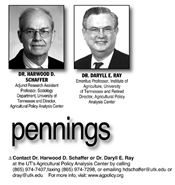|
Tom Vilsack To Be Nominated To Return As Secretary Of Agriculture

The incoming Biden administration has announced that it will nominate Tom Vilsack as Secretary of Agriculture, a role he held for the 8 years of the Obama Administration. This announcement has been greeted with mixed reviews.
On the one hand, the California Farm Bureau President Jamie Johansson said, “Given all the stresses placed on the food and agricultural system by the pandemic in particular, it will be good to have an experienced person resume administration of the Agriculture Department… Tom Vilsack will be able immediately to guide USDA for the benefit of farmers, ranchers, rural residents and all the people who depend on our nation’s agricultural production” (https://tinyurl.com/ydx5z5l6).
On the other, Charlie Mitchell, in an article titled “Tom Vilsack for Agriculture Secretary Worries Environmentalists: Vilsack represents a return to a status quo that doesn’t adequately address climate change” writes, “A number of progressive activists and environmental leaders are up in arms about the pick, pointing to Vilsack’s friendly history with polluters and failure to enact substantive regulation during his eight years in office from 2009 to 2017. ‘Pulling Tom Vilsack directly from the dairy lobby to the agency meant to regulate that industry would be disastrous for the climate,’ Jennifer Molidor, senior food campaigner for the Center for Biological Diversity, wrote to Sierra. ‘The US needs a secure, just, and climate-friendly food system, not an agency chief who will continue business-as-usual while the climate crisis grows’” (https://tinyurl.com/ydc77yq2).
With the exception of the trade payments and the COVID-19 payments, the farm policies Vilsack inherits as he returns to the Agriculture Secretary job are essentially the same ones he shepherded through Congress when he previously served in that post.
These policies, ARC and PLC, do not and cannot provide adequate income to farmers because they are built on the assumption that any downturn in farm prices and incomes is temporary and we just need a program to tide farmers through a short rough spot. These policies are ineffective in dealing with a long period of low prices and a world in which supply regularly outstrips effective demand.
One could argue that in developing farm policy Vilsack had to deal with a Republican Congress that limited what he could do. For instance, he worked with chicken farmers on contracting issues and held a series of high-profile hearings only to have Congress fail to fund the writing of new rules.
Under Vilsack we will probably see fewer RFS waivers but in a period of emphasis on increased fuel economy and travel stunted by COVID-19 the demand for gasoline and thus ethanol and the corn that is used to produce it will result in fewer gallons of ethanol needed no matter what the Secretary does.
From our perspective the weakness of demand enhancement programs like the RFS is that the new demand gets baked into the supply-demand equation and these programs lack policy tools to deal with long periods of low prices because the production of agricultural commodities typically exceeds utilization.
The RFS was a price booster as long as the ethanol demand for corn increased by some 500 million bushels per year but when the blend wall was reached and the quantity of supplied by US farmers exceeded the quantity demanded prices fell dramatically. Would E-15 provide a price boost? Yes, until the target is hit and then we will be in the same pickle we are in today.
Much of the prospect for what, from our perspective, are positive ag policies will depend more on the outcome of the senatorial elections in Georgia that will be held between our writing of this column and the time our readers see it.
If McConnell still controls the Senate then, from our perspective there is little hope for a positive change in farm policy. Instead there will be a tweaking around the edges of farm policies that have shown their inability to support a reasonable level of net farm income. The result will be a steady increase in the number of farm bankruptcies.
And that is a problem for which Vilsack will have to find a solution. ∆
DR. HARWOOD D. SCHAFFER: Adjunct Research Assistant Professor, Sociology Department, University of Tennessee and Director, Agricultural Policy Analysis Center
DR. DARYLL E. RAY: Emeritus Professor, Institute of Agriculture, University of Tennessee and Retired Director, Agricultural Policy Analysis Center
|
|